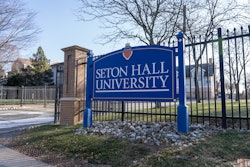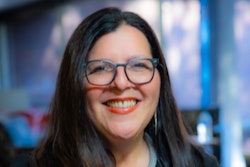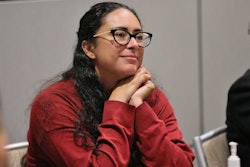 Ariana Ahmed, student body president at Hunter College.
Ariana Ahmed, student body president at Hunter College.
HC runs a program designed to enhance and support the academic experiences of Asian American Pacific Islander (AAPI) students on campus, funded through a federal Asian American Native American Pacific Islander Serving Institution (AANAPISI) grant. The program, the Hunter College AANAPISI Project (HCAP), helped Ahmed find belonging on her campus.
“AANAPISI programs have received the funding and incentive to host student ideas and projects,” said Ahmed. She eventually hosted her own HCAP event to discuss AAPI queerness. As Ahmed’s confidence grew, and she eventually became student body president.
“When you come to a school as big as Hunter, it’s easy to feel scattered. You see community, but don’t have the means of connection,” said Ahmed. “HCAP is a bridging factor. It gives students a reason to stay on campus and build a community they might have missed at other institutions that are not geared towards AAPI students.”
This week is the 15th anniversary of the creation of the AANAPISI federal designation. Eligible institutions qualify if they enroll a student population of at least 10% AAPI students, and 50% of more of the overall student body qualifies for financial assistance like the Pell Grant. Asian & Pacific Islander American (APIA) Scholars, a nonprofit AAPI scholarship provider, gathered experts together to celebrate how AANAPISI grant programs have instilled a sense of belonging in students like Ahmed, helping them grow in their identities and reach their educational potential.
But, the scholars said, AANAPISIs still lack the funding needed to make even more of an impact, with just around $75,000 available per eligible institution. Further, access to AANAPISI grants can be complicated when institutions qualify as more than one federally designated Minority Serving Institution (MSI).
 Dr. Robert A. Underwood, former president of the University of Guam.
Dr. Robert A. Underwood, former president of the University of Guam.
“AANAPISIs become the vehicle to present innovative programming, tailored to the needs of our students in our community to help them succeed and increase graduation rates,” said Underwood.
Between 2018 and 2022, the number of institutions eligible to receive AANAPISI grants has jumped 81% from 110 to 199. That means they are the second largest number of MSIs in the country, behind HSIs. Yet there are only 30 institutions in the U.S. currently taking advantage of these grants.
AAPI students, faculty, and staff alike are haunted by the racist stereotype “model minority,” which perpetuates the false idea that all AAPI individuals are well-off financially and face no hurdles in education. This myth, the experts said, makes AAPI student issues invisible to administrators and is not helped by a lack of disaggregated data for the many AAPI student subgroups.
“Data disaggregation is crucial,” said Dr. Timothy P. Fong, a professor of ethnic studies at California State University, Sacramento. Almost a decade ago, he pushed his institution to disaggregate the data they had collected on their AAPI students. He found that AAPI students were graduating at lower rates that the university average.
“I would tell this to administration at the time, and they’d say, ‘I didn’t know that!’ Later, I’d tell them again, and they’d say again, ‘I didn’t know that!’” said Fong. “There is a cognitive dissonance of understanding because the ‘model minority’ myth is so strong.”
Fong said Sacramento State has changed since that time, although he added that progress is delicate. He has applied for and received three AANAPISI grant funds. But, because Sacramento State has dual designation as an HSI, his grant applications are limited.
 Dr. Timothy P. Fong, professor of ethnic studies at California State University, Sacramento.
Dr. Timothy P. Fong, professor of ethnic studies at California State University, Sacramento.
“Unfortunately, in terms of types of grants in Part A, those have much more funding allocated to the institutions. Difficult choices have been made in dual or triple designated institutions, which has resulted in one group of a student population being focused on and selected because of funding opportunities,” said Fond. “Sadly, this really does have a negative impact on the campus climate of the institutions because it jeopardizes a sense of belonging.”
Dr. Rowena M. Tomaneng, president of San Jose City College (SJCC), said this dual designation barrier has been a “challenge” for her. SJCC qualifies as an AANAPISI, but currently only receives HSI funding. But that doesn’t mean she ignores her AAPI students. Instead, she’s had to think creatively about how to use other resources available from state and local partnerships.
“It is really about the institutional commitment—and that’s the challenge for leaders across our different institutions,” said Tomaneng. “Just because you don’t have funding doesn’t mean you can’t embrace that identification and begin to support, little by little, your AAPI students.”
Liann Herder can be reached at lherder@diverseeducation.com.
















